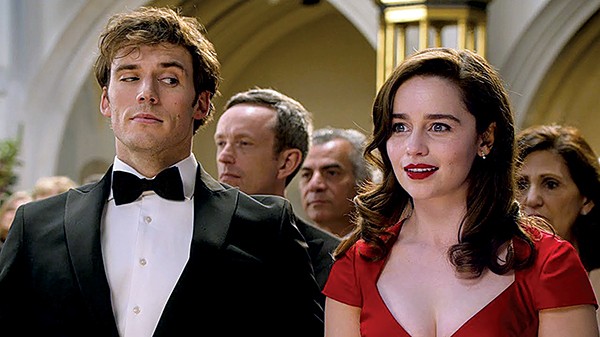We begin our story in the women’s restroom of the Paradiso movie theater. I am peeing. I am also listening to the sound of five or six teenage ladies crying — full on, chest-heaving bawling. One of them is angry: “Why would they think that ending was OKAY?!”
I am ashamed to leave the stall. I did not cry at all during Me Without You, the summer’s romantic-tragic blockbuster about assisted suicide. I listlessly examine my ply of toilet paper and ask myself: What’s wrong with me? Am I even human? How did I get here?
Surely, it’s the algorithm’s fault. In bleak mid-winter, I began to see the ads every time I opened my browser. The plot of Me Before You is adeptly summarized by the estimated 18,000 different versions of the trailer, pushed to my smartphone via Instagram, Facebook, Twitter, YouTube, whatever. Checking my feeds for the past few months has been like walking around wearing a human billboard that reads “EILEEN IS GONNA PAY 11 BUCKS TO SEE THIS SHIT.”

Me Before You starring Emilia Clarke and Sam Claflin
You can learn this much from 30 seconds of nested advertisement: Louisa Clark (Emilia Clarke, or the Mother of Dragons) is a kind, small-town woman with wacky taste in sweaters and few ambitions. She becomes a caretaker for total babe Will Traynor (Sam Claflin), a paraplegic man whose life of wealth and success has been cut short by a spinal cord injury. He has a bad attitude, but Lou brightens it. You can tell when they fall in love because Lou starts wearing sexier outfits. Then we learn that Will has been planning to kill himself. Can her love save his life? Has it saved hers?
There should be an adjective for rom-com movie plots that are just Pride and Prejudice with modern gilding. We could call them Pri-prejudicial. They work off the Austenian premise that when a blank-slate woman meets a rich and smart and inevitably rude man, she can teach him about having a heart. He, in turn, will neg her into a broader understanding of the world.
These Pri-prejudicial plots are usually successful because women like myself pour ourselves onto the shell of a female lead. The fantasy is that we don’t need to offer anything, not even a whole human personality, in order to be loved by a man with limitless hotness and power. We are relieved of the burden of our own growth. When Lou proclaims to Will, “I have become a whole new person because of you,” it reverbs through an echo chamber built inside the hollow husks of a century’s worth of empty women characters.
This is where MBY gets interesting. Spoilers ahead. Instead of the usual ending, MBY kills Will Traynor. He sacrifices himself so that Lou can have a full life. He leaves her a trust fund and instructs her to enjoy herself.
We have our usual all-knowing paternal archetype in Will, a father, boyfriend, and omnipotent God wrapped into one, who teaches Lou to love classical music and watch movies with subtitles. But in order for Lou to fulfill the character growth portended by her sexy mid-movie makeover, the dude has to actually die. We get a Lou, then, that is both the perfect wife/caregiver heroine AND the perfect independent woman. Is this a radical feminist tale in which Lou, mother spider, must eat her husband post-consummation to gain her full power?
It is, at least, a working excuse for why I exited the bathroom and raised an eyebrow at my weeping peers. Toughen up, ladies. We’ve got some men to eat.